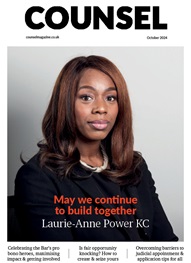*/
Salary and reluctance to make Circuit visits deter potential High Court judges, but the prestige of appointment is still a major draw.
The report, The attractiveness of senior judicial appointment to highly qualified practitioners, published in January and based on interviews with six recently appointed high court judges and 29 highly qualified solicitors and barristers, revealed that the effect of the Circuit requirement was, for some practitioners, “a temporary deterrent to judicial application as children are growing up, while for others it represents a permanent barrier to application”.
Lord Judge, the Lord Chief Justice, in his foreword, said the research reflected “misapprehensions” about judicial life on Circuit—in fact the system for Circuit visits was “extremely flexible” and some High Court judges did not visit a Circuit at all, he said. Although a “wholehearted defender” of the Circuit system, the Lord Chief Justice said that it is possible for arrangements to be made to accommodate judges whose circumstances mean that they cannot be away from home.
Professor Dame Hazel Genn, the report’s author, said: “Judges in post talked of the satisfaction offered by a judicial post, including the opportunity to be the decision-maker, the intellectual challenge, public service ethic, prestige and financial security.
“Practitioners not seeking a salaried judicial appointment said they were deterred by the workload and working conditions, salary, loss of autonomy, a preference for advocacy rather than decision making and a belief that their temperament is more suited to the Bar than the Bench.”
Commissioned by the Judicial Executive Board, the research is separate from current Judicial Appointments Commission research, which is due to complete in the spring. The report is available at www.judiciary.gov.uk/docs/report-sen-jud-appt.pdf.
The report, The attractiveness of senior judicial appointment to highly qualified practitioners, published in January and based on interviews with six recently appointed high court judges and 29 highly qualified solicitors and barristers, revealed that the effect of the Circuit requirement was, for some practitioners, “a temporary deterrent to judicial application as children are growing up, while for others it represents a permanent barrier to application”.
Lord Judge, the Lord Chief Justice, in his foreword, said the research reflected “misapprehensions” about judicial life on Circuit—in fact the system for Circuit visits was “extremely flexible” and some High Court judges did not visit a Circuit at all, he said. Although a “wholehearted defender” of the Circuit system, the Lord Chief Justice said that it is possible for arrangements to be made to accommodate judges whose circumstances mean that they cannot be away from home.
Professor Dame Hazel Genn, the report’s author, said: “Judges in post talked of the satisfaction offered by a judicial post, including the opportunity to be the decision-maker, the intellectual challenge, public service ethic, prestige and financial security.
“Practitioners not seeking a salaried judicial appointment said they were deterred by the workload and working conditions, salary, loss of autonomy, a preference for advocacy rather than decision making and a belief that their temperament is more suited to the Bar than the Bench.”
Commissioned by the Judicial Executive Board, the research is separate from current Judicial Appointments Commission research, which is due to complete in the spring. The report is available at www.judiciary.gov.uk/docs/report-sen-jud-appt.pdf.
Salary and reluctance to make Circuit visits deter potential High Court judges, but the prestige of appointment is still a major draw.


Our call for sufficient resources for the justice system and for the Bar to scrutinise the BSB’s latest consultation
Marie Law, Head of Toxicology at AlphaBiolabs, discusses alcohol testing for the Family Court
Louise Crush of Westgate Wealth explains how to make sure you are investing suitably, and in your long-term interests
In conversation with Matthew Bland, Lincoln’s Inn Library
Millicent Wild of 5 Essex Chambers describes her pupillage experience
Louise Crush of Westgate Wealth explores some key steps to take when starting out as a barrister in order to secure your financial future
From a traumatic formative education to exceptional criminal silk – Laurie-Anne Power KC talks about her path to the Bar, pursuit of equality and speaking out against discrimination (not just during Black History Month)
James Onalaja concludes his two-part opinion series
Expectations, experiences and survival tips – some of the things I wished I had known (or applied) when I was starting pupillage. By Chelsea Brooke-Ward
If you are in/about to start pupillage, you will soon be facing the pupillage stage assessment in professional ethics. Jane Hutton and Patrick Ryan outline exam format and tactics
In a two-part opinion series, James Onalaja considers the International Criminal Court Prosecutor’s requests for arrest warrants in the controversial Israel-Palestine situation